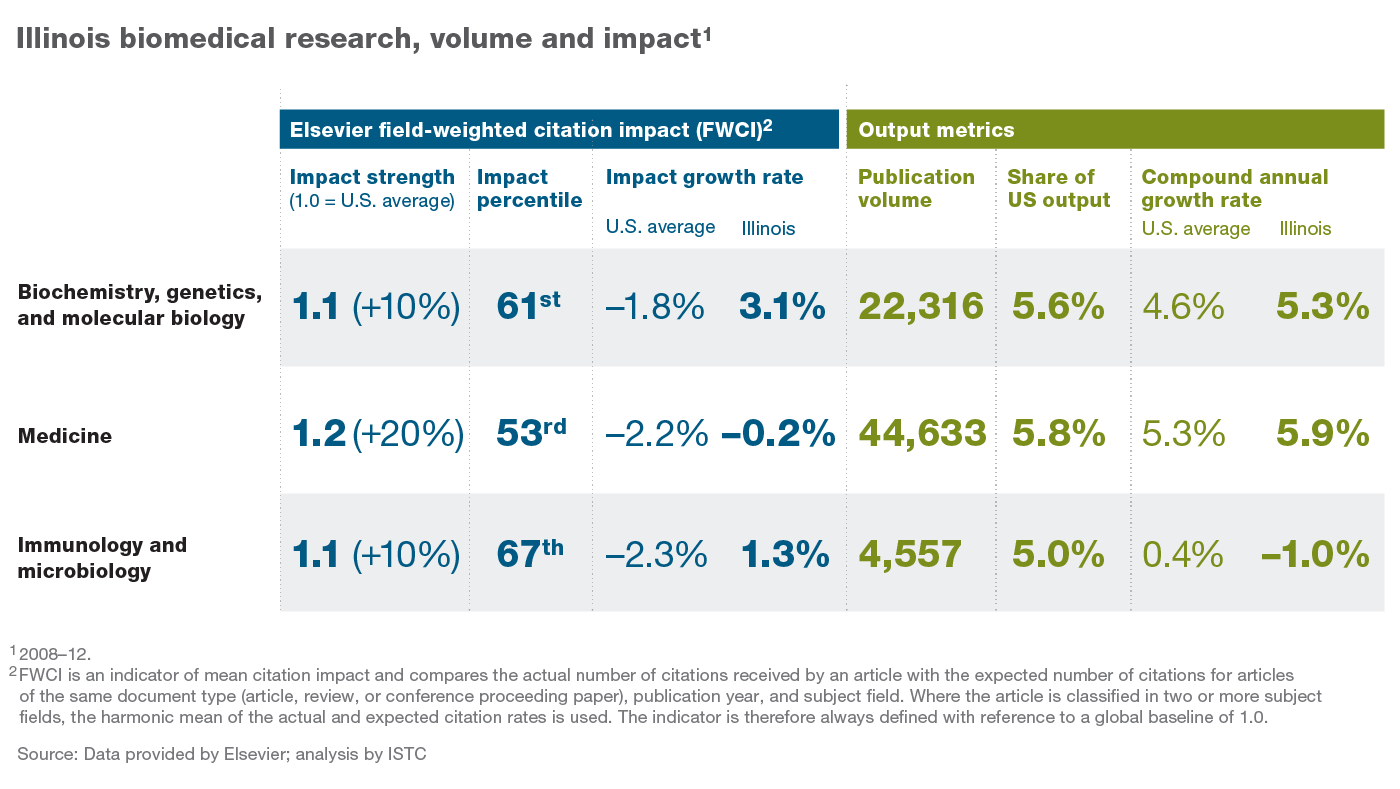By Warren Ribley, Executive Director, Illinois Medical District Commission In the recently published Science and Technology Roadmap, the Illinois Science and Technology Coalition identified biomedical research as Illinois’ fastest growing research field and one of the State’s emerging technology clusters. The impact of Illinois’ academic research in disciplines such as biochemistry, genetics, molecular biology, immunology and microbiology has significantly outpaced the national average in recent years. Network analysis of patent data revealed that the biomedical cluster in Illinois consists of at least 229 local and out-of-state organizations involved in research, translation, and commercialization.
Translating Illinois’ treasure trove of biomedical research from the laboratory to the clinical setting – taking it from bench to bedside – is a time-consuming and expensive process that requires alignment among multiple partners. Consider this, according to Weill Cornell Medical College, it takes an average of 17 years, and then, only 14% of new scientific discoveries ever enter day-to-day clinical practice. 
Here at the Illinois Medical District (IMD), innovative efforts are underway to speed more efficient and effective medical advances that save lives and support a growing and vibrant health care ecosystem. This is accomplished by coordinating basic research, providing incubation facilities for startups and delivering access to entrepreneurial and investor networks. These efforts add momentum in Illinois and Chicago around translational research largely funded through federal NIH support. Local universities have successfully competed for NIH funding to create the Northwestern University Clinical and Translational Sciences (NUCATS) initiative, the Institute for Translation Medicine (ITM) led by the University of Chicago, and the Chicago Area Patient Centered Outcomes Research Network (CAPriCORN) in which the IMD plays a critical role. Since 2007 these initiatives have captured $87 million in NIH funding. NIH funding also supports 500 principal investigators at the IMD.
The IMD is the largest urban medical district serving the most diverse patient population in the country. Comprised of four institutions – Rush University Medical Center, the University of Illinois Hospital and Health Sciences System, the John H. Stroger Jr. Hospital of Cook County, and the Jesse Brown Veterans Administration Medical Center – the IMD conducts more than 700 clinical trials each year, attracting $392 million in research funding. The IMD’s Chicago Technology Park, the nation’s first biotech cluster, hosts more than 30 successful life science and clean energy firms as well as the HTI, a proof of concept and shared laboratory space occupied by emerging business enterprises.
By bringing together medical researchers, clinicians, private industry and biotech entrepreneurs, the IMD is fostering innovative research and helping make translational medicine a reality. Comprising representatives from all four hospitals and universities, the IMD has recently created an Innovation Alliance to provide entrepreneurs streamlined access to these experts in technology transfer, hospital administration, clinical research and venture capital. The Alliance has also facilitated entry of Vivacelle Bio and ProofX to the Health Technology Innovation (HTI) center within the IMD’s Chicago Technology Park, adding jobs and promoting new technology.
The IMD is also in the process of creating a first of its kind patient advocacy hub in which patient advocacy groups and industry would collaborate in one working space. The IMD also acts as project manager for the unprecedented collaboration of ten Chicago region health and hospital organizations that is one of eleven nodes of a national network funded by the Patient Centered Research Outcomes Initiative (PCORI). It is designed to change how the results of medical research studies are shared with frontline clinicians, voluntary health organizations, patient advocacy groups and patients at large.
Researchers from CAPriCORN will capture health data from more than one million patients to study both rare and common conditions such as sickle cell disease, asthma, anemia, recurrent clostridium difficile, obesity and diabetes. Chicago’s best doctors, researchers and bioinformatics experts have overcome intense institutional competition to build a shared platform that will analyze disease traits across multiple diverse populations and ultimately improve treatments at the patient level. CAPriCORN has led to the development of even more new ventures. The Central Chicagoland Area Institutional Review Board is streamlining the process of conducting clinical trials across member institutions. The Medical Research Analytics and Informatics Alliance (MRAIA) is securing integration and analysis of healthcare data to advance public health applications.
The IMD is uniquely positioned to advance biomedical innovation in Chicago, Illinois and the Midwest. By aggregating resources through collaboration, the IMD is creating synergy that will change the bench to bedside paradigm and enable the translation and eventual commercialization of more high-level biomedical research conducted in Illinois.
Watch and Listen
City Club of Chicago: Warren Ribley, Executive Director, Illinois Medical District Commission, outlines his vision for the District
IMD – District of Opportunity
Learn
- IMD’s Chicago Technology Park: the nation’s first biotech cluster
- NIH NCATS: transforming the translational science process
- Chicagoland Biomedical Consortium: transforming research at the frontiers of biomedicine
- MATTER: a community of healthcare entrepreneurs and industry leaders working together to fuel the future of healthcare innovation
More News
- Illinois Medical District approves $300 million capital project
- $3 million granted to the Chicago Biomedical Consortium (CBC)
- Healthtech incubator Matter announces $4.4 million in private funding
- Business has Obama’s back on immigration
- The founder of Freshwater Advisors on the importance of a fast ‘no’
- Glenbrook South students take part in STEM project
Illinois Innovation Network Featured Resource:
Illinois Innovation Network Featured Resource: Each month, the Illinois Science and Technology Coalition features a service or resource available to innovators and entrepreneurs in the state of Illinois on the Illinois Innovation Network. To learn more and add your resource to the Network, click here.  Wellspring products enable you to innovate faster, access knowledge quickly, and optimize your investments in research and innovation. Companies use our software to identify, evaluate, and share knowledge assets developed by and among their network of collaborators: from Tech Scouting to IP Management to Open Innovation initiatives. Universities and hospitals turn to Wellspring software to manage their Technology Transfer, Grants Management and Clinical Trials Administration more effectively and efficiently. In sum, our software enables innovators to harness their knowledge assets for competitive advantage. Continue reading at Illinois Innovation Network
Wellspring products enable you to innovate faster, access knowledge quickly, and optimize your investments in research and innovation. Companies use our software to identify, evaluate, and share knowledge assets developed by and among their network of collaborators: from Tech Scouting to IP Management to Open Innovation initiatives. Universities and hospitals turn to Wellspring software to manage their Technology Transfer, Grants Management and Clinical Trials Administration more effectively and efficiently. In sum, our software enables innovators to harness their knowledge assets for competitive advantage. Continue reading at Illinois Innovation Network![]()
